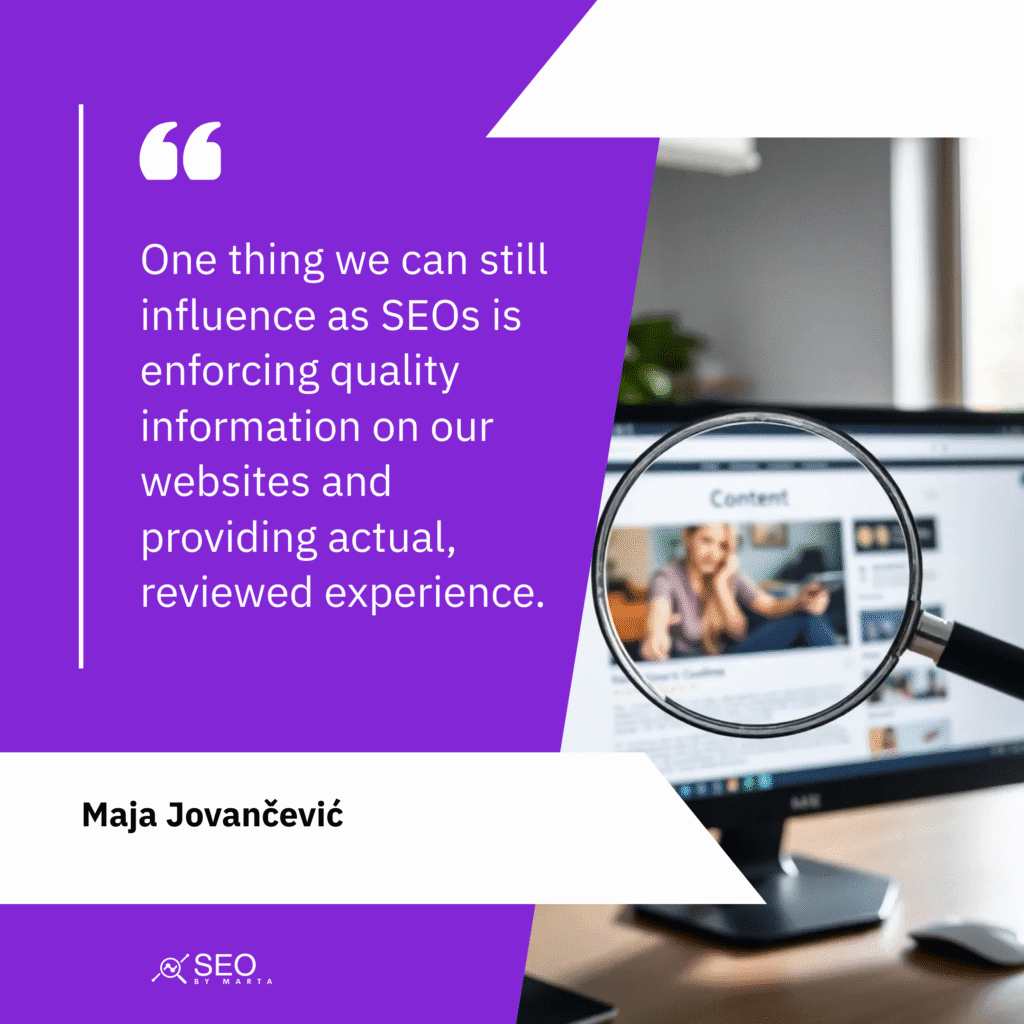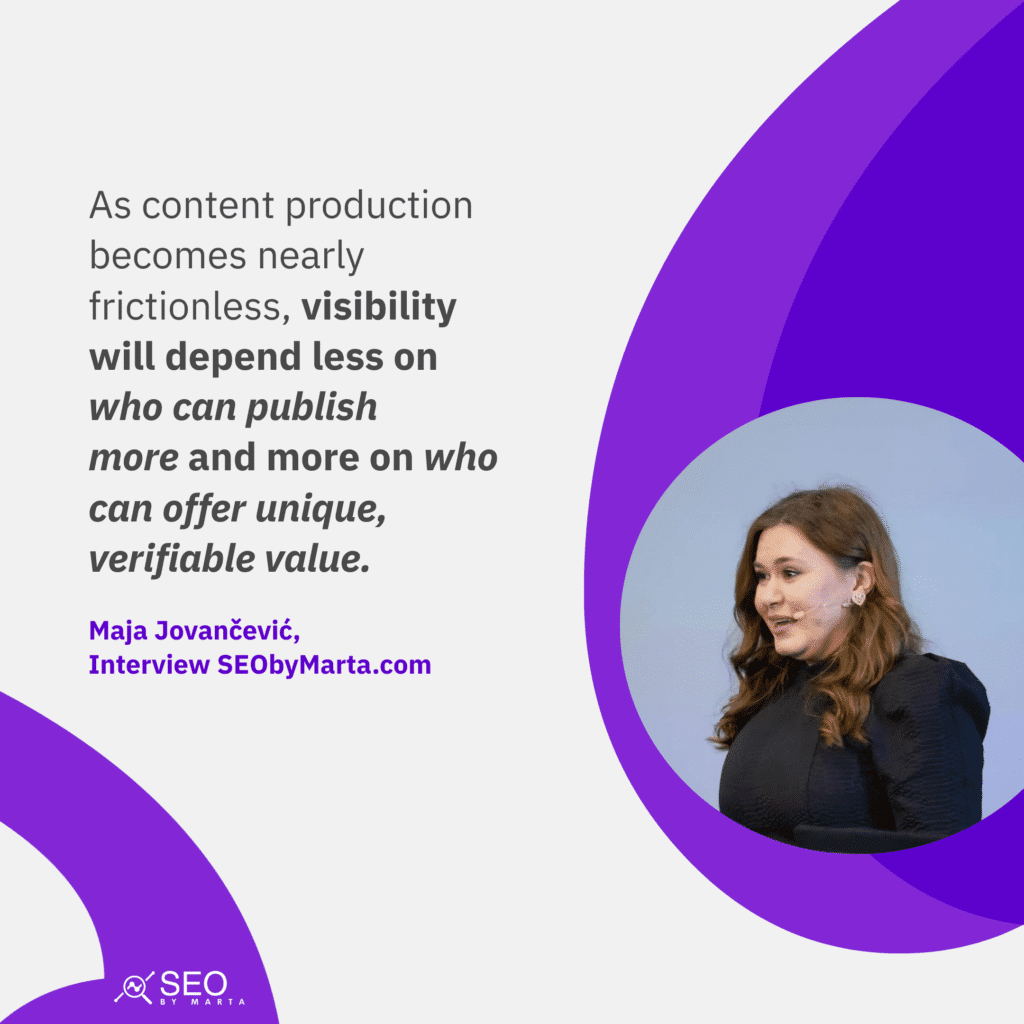About Maja Jovančević
Maja Jovančević is a recognized SEO expert specializing in the highly competitive iGaming sector. With years of hands-on experience driving visibility for casino brands and affiliates, she has become a go-to strategist for those navigating the unique challenges of iGaiming SEO. Maja’s expertise spans technical SEO, content strategy, and link building, but she is especially known for her ability to scale affiliate operations in markets where competition is fierce and trust is hard-won. Passionate about the intersection of innovation and responsibility, she helps affiliates integrate AI into their content workflows without sacrificing compliance, credibility, or user experience.
Interview – How Affiliates Can Use AI Responsibly to Scale Content Without Losing Trust
Affiliate marketing in iGaming is a constant balancing act: the need to scale fast while staying compliant, trustworthy, and ahead of both competitors and Google’s algorithm. The arrival of generative AI has opened the door to unprecedented efficiency — but also new risks if content becomes shallow, duplicated, or loses credibility. Maja Jovančević has seen these shifts firsthand, working with affiliates on the front lines of Casino SEO. In this interview, she shares her perspective on how AI can transform affiliate content creation, where human expertise still matters most, and what strategies affiliates should adopt to win both rankings and user trust in 2026 and beyond.
Q: Maja, affiliates have always faced pressure to scale quickly in Casino SEO. How has the arrival of AI changed the way affiliates approach content creation?
A: My actual answer:
Since the early days of SEO, everybody was trying to save on content costs. They were trying to save on content costs for links. They were trying to save on content costs for the websites, especially if you had a website that generated pages like crazy, such as in e-commerce.
And there were multiple techniques for how this came to be. For example; programmatic content. It was doing decently well, especially for fact heavy content where you needed to generate phrasing around the facts. There was also spun content. There were plenty of tools that were replacing your words with synonyms, and then would produce a word salad out of all of these, which was then manually reviewed (or not).
A completely different question is “was it working”.
Plenty of these “solutions” were used in SEO, yet none of these was actually done with the user in mind. It was just content that was supposed to serve the purpose, which is to get something online and save money. Potentially target some ranking factors such as internal links, freshness etc. Now, this way of approaching content creation, when AI went mainstream, actually multiplied because people realized that instead of sending a brief, you can just paste it to ChatGPT and see what you get. And people were actually surprised at the quality of the results compared to cheap writing services. There were other content writing tools such as Jasper AI, there were new options being launched such as Gemini Deep Research and suddenly, generating content was easy. But it came with other problems.
How ChatGPT5 rephrased it after a few prompts on my personal style:
Since the early days of SEO, there’s been a constant drive to reduce content costs — for link building, on-site copy, or large-scale setups like e-commerce where pages multiplied rapidly. Over time, many techniques emerged to make production faster and cheaper: programmatic content worked decently for fact-heavy topics, while spun content relied on tools that replaced words with synonyms and churned out what often became “word salad,” sometimes manually reviewed — sometimes not.
Many of these “solutions” were used widely, but few were ever created with the user in mind. The goal wasn’t engagement or clarity — it was efficiency, ranking signals, and box-ticking: internal links, freshness, topical coverage.
When AI became mainstream, that approach didn’t disappear — it multiplied. People quickly realized they could skip the content brief altogether and simply prompt ChatGPT or similar tools. The output, while generic, often outperformed the cheapest writing services, which made automation even more appealing. With new AI content tools like Jasper and emerging systems such as Gemini Deep Research, content generation suddenly became effortless.
But that shift introduced a new set of challenges — from oversaturation and sameness to deeper questions about authenticity, value, and what “quality content” really means in an era where anyone can produce it instantly.
Now, you can see exactly what happened here. Obviously, my grammar looks better. My sentences flow naturally. But my phrases are templated, the points I was making were “corrected” (I didn’t paste the brief, I prompted the AI), and the other styling clues are there (wink). I lead content teams, I use different AIs so often that I can confidently tell when something was AI generated, sometimes I can even pinpoint a model, and if you don’t do the same, you’re losing the QA game.

Q: In such a high-trust niche, how can affiliates balance AI-generated efficiency with the authenticity needed to build credibility with both Google and players?
A: Google Search operates on the Google Search algorithm. Affiliates want to rank high. Some patents have clearly defined what content that ranks should “look” like, and some SEOs have even gone so far as to prove the point that you can get content ranked using Lorem Ipsum (khm khm, we all know this).
The credibility is built with the player. The same player who comes, opens the page, and clicks on the affiliate link without even reading the text, as the bonus offer is too good to pass up.
As an SEO who believes in providing quality content, I have noticed that people used to skim the written content; now, the expected behaviour is to have it summarised by AI.
This question, although well-crafted, might be obsolete very soon. We might not need credibility to rank. And this is a very sad reality. One thing we can still influence as SEOs, is enforcing quality information on our websites and providing actual, reviewed experience. The number of words might become obsolete very soon, but facts and UX won’t. And that is where AI-heavy websites will start to fail. That and the footprint.
Q: What are some practical use cases where AI content works well for affiliates — and areas where you believe human expertise is non-negotiable?
A: AI-generated content, especially with custom-trained AI, has multiple uses and can work well for affiliates. For how long, that is the question. What AI can’t actually do is test and confirm or disprove a fact, and this is where humans are invaluable.

Q: E-E-A-T is still central to Google’s evaluation of gambling sites. How can affiliates ensure that AI-assisted content still demonstrates expertise, authority, and trust?
A: Let’s ask AI: AI can support content production, but it can’t replace the credibility or experience signals that make E-E-A-T visible to both users and search engines. The key is understanding that AI should enhance expertise, not simulate it.
Affiliates can approach this by separating generation from validation. AI can assist with structure, ideation, or drafting, but the final layer — expertise, accuracy, and integrity — must come from real human oversight. Fact-checking, referencing credible data sources, and attributing insights to genuine experts remain non-negotiable.
Trust also comes from context and consistency. Even the most polished AI content won’t demonstrate authority if the site lacks clear ownership, transparent editorial standards, or a recognizable voice. Affiliates who build those layers — by showing who’s behind the content, maintaining transparent review processes, and aligning with compliance requirements — send much stronger E-E-A-T signals than those who rely solely on machine-written text.
In short, AI can scale the “how,” but humans must safeguard the “why.” That’s what keeps content credible in a space where the stakes, regulation, and competition are high.
I can say that AI is completely correct on this, and the reason AI is correct is precisely because Google has built their algorithm to filter out low quality content so AI can feed off of quality content and give decent replies. However, if publishers continue trying to game it without an added QA layer, you might end up with a huge AI footprint. Just Google “turn0search21”
Q: We’ve seen cases where mass-produced AI content has led to penalties or visibility drops. From your experience, what mistakes should affiliates avoid at all costs?
A: These are not mistakes. These are learning curves. I applaud the pioneers in the space who have tested multiple approaches with AI content writing, and I hope that they will share their learnings. I am one of them, albeit a very conservative one 🙂
Q: With AI accelerating content production, competition is fiercer than ever. What strategies can affiliates use to stand out, not just in Google, but also in AI-driven search results?
A: This is what AI says: As content production becomes nearly frictionless, visibility will depend less on who can publish more and more on who can offer unique, verifiable value. Affiliates that want to stand out in both traditional and AI-driven search ecosystems need to focus on signals that LLMs can recognize and trust — depth, accuracy, and distinctiveness.
In practical terms, that means building first-party knowledge instead of derivative summaries. Insights drawn from original data, user research, or genuine expertise are far more likely to be cited or surfaced by AI systems that prioritize source credibility. Structured data, clear author attribution, and transparent editorial frameworks also help models interpret and validate authority. Equally important is semantic consistency — having interconnected content that reinforces key entities, expertise areas, and topical depth. This not only strengthens organic visibility but also trains AI systems to associate your domain with reliable, domain-specific knowledge. In short, the affiliates that win won’t be the ones who generate the most text — but the ones who generate trustworthy information that both Google and AI models can confidently reference.
Everyone knows that this is basic SEO. Experiments say that AI is wrong. I wish I could share more.
Q: Looking ahead, do you think AI will widen the gap between small affiliates and large networks — or could it level the playing field?
A: Here’s what I hope will happen:
- Search Engines fine-tune their algorithm with that quantum chip they recently announced to elevate how they process quality. As a result, the web is cleaner.
- AI becomes another Search Engine which pays content creators for using their content when they ground their search.
- Users end up using AI to save time as the new consuming “summarised” content behaviour is built.
- Affiliation is reinvented through quality and AI doesn’t break the business model. If they use content from affiliates, they send players to affiliates.
- Affiliates find another way to stay worthy of traffic.
Q: If you had to give one piece of advice to affiliates exploring AI for the first time, what would it be?
A: Test AI-generated content on websites you’re not afraid to lose and always human QA the final product.
Conclusion
AI has changed the rules, but not the fundamentals. As Maja Jovančević makes clear, the future of iGaming SEO won’t be won by those who publish the most, but by those who publish with purpose. Automation can accelerate production, but it can’t replicate experience, judgment, or trust — the elements that separate credible operators from content mills.
In 2026 and beyond, scaling responsibly means more than efficiency; it means integrating AI without abandoning authenticity. The future of affiliate SEO won’t be written by prompts alone. It will belong to the professionals who test fearlessly and edit ruthlessly, using AI to accelerate quality, not to replace it. In a world where anyone can generate content, authentic insight becomes the rarest currency. And that’s where true authority and lasting rankings will always live.




